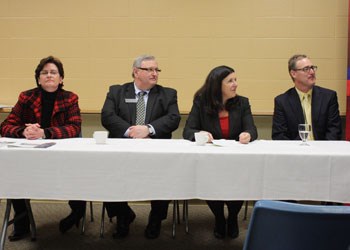While it's easy to recycle, it's difficult to know what kind of real impact a program has on waste and the environment. The City of Yorkton, Communities of Tomorrow and Agmar International Marketing have partnered with the University of Regina to have a class of Engineering students study recycling in the city, where products go, and what the impact is overall.
Dena McMartin is a professor at the University of Regina and has taught the Environmental Design and Impact class which took on the project. She says that the goal was to see what happens to the products once they leave the city.
"What they discovered was some products end up in Kentucky, some go overseas to China, others do stay in Canada but very few stay in Saskatchewan. What they look at then is by tracing the transport and movement of recycled materials, look at the carbon footprint. Does recycling actually improve our environmental situation or create a challenge we haven't looked at before?" McMartin says.
She says that it's possible that recycling is less earth friendly than previously expected, but says that there are many issues with resource management surrounding recycling, as with less recycling more mining needs to take place.
"The issue gets bigger and bigger as we think more about where materials come from, how they're processed, how they're transported. I give huge kudos to both the City of Yorkton and our students for trying to take on such a big issue."
Yorkton was chosen for the project because the city is a leader in recycling, McMartin says, and it's the first city which decided to look at the overall impact recycling programs are having in the environment.
The project started in January, and the students have another six weeks to work on it and put their conclusions in their final reports. Those reports will then be combined into one big report that will be presented at the end of May. The final report will have recommendations for the best way to manage solid waste in the city from an environmental perspective.
McMartin says she hopes the final report will help the city move towards its goal of having zero net waste to the landfill by 2026. She says that the goal is ambitious and forward thinking, and hopes that this report will help in that direction.
The experience is also invaluable for students, she suggests adding, that it's a real world situation that new engineers need to learn about in order to progress in their careers.
"They get to work on a real world problem and feel as though they're working on something that matters in the world. They get to work on their professional communication skills, about formal report writing and interacting with clients, and help define a problem with a municipality. That's invaluable, there's no way we can help create that situation at the University without help from places like the City of Yorkton."
She says that the next step for this program is to expand to the rest of the province, as new programs require municipalities to examine recycling options.




